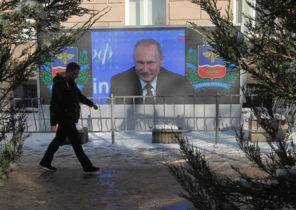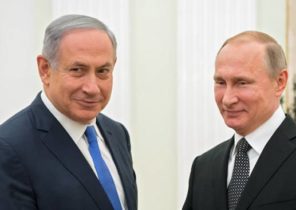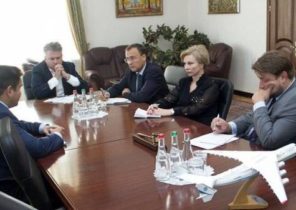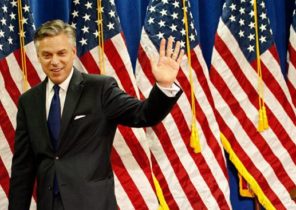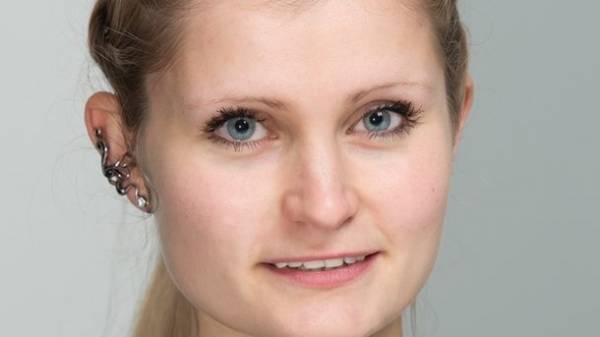
Germany on the threshold of elections in the Bundestag on 24 September, the Germans go to the polls to choose new Parliament, which then will form a government. The latest polls show that Chancellor Angela Merkel’s chances of re-election for a fourth term – her Christian democratic Union give up to 40% of the seats in the new composition of the Bundestag.
The main struggle will unfold after the election during the “coalized”. The probability that the new government will form the Christian democratic Union (CDU) and Social Democrats (SDP) – today members of the coalition. But, according to experts, it is possible and surprises. If, for example, the liberal Free democratic party (FDP) or the Green Party will gain more than they give polls, they can easily enter into a coalition with Merkel’s party, leaving behind its current ally of the Social Democrats. Or, while the Christian Democrats will lead the coalition negotiations, their current coalition allies and at the same time the main opponents in the elections the Social Democrats could form an Alliance with the Green or far-left party Die LINKE – the Constitution does not prohibit this.
For Ukraine the results of the elections to the Bundestag, little will change. With high probability Angela Merkel will remain in an armchair of the Chancellor, and thus will remain the main leader of the “Norman format” and will continue to support Ukraine in the European Union. But wait, what the position of the official Berlin and Brussels on the possible future membership of Ukraine in EU and NATO will change, not worth it. First, with the growing sentiment of euroscepticism in the EU (which we clearly saw during the referendum in the Netherlands on the fate of Association with Ukraine, when more than 60% of the Dutch voted against) European leaders do not want to once again excite the public issue of the next possible EU enlargement to the East. Secondly, once again do not want to quarrel with Russia, which annexed the Crimea and launched war on Donbass more in order to keep Ukraine within its orbit of influence, making it impossible our integration into the EU and NATO.
Also, according to German experts, the business in Germany are increasingly raises the question of how long will work the anti-Russian sanctions and when they can be cancelled. It is in the interests of large industrial corporations and has done his recent scandalous statement by the leader of the German liberals, Christian Lindner, which caused a lot of noise in Ukraine. Between the lines of his statement in a recent interview can be read as “until forget about the Crimea”. However, according to experts, to Lindner Ukrainian issue in the election campaign in Germany was practically absent. Politicians mostly discussed the immigration crisis and deteriorating with each passing day, relations with the United States.
Together with a research fellow at the policy of the European Council of foreign relations (ECFR) Ulrike Franke website “Today” to find out why trump Merkel personally dislikes, what are the chances of sympathizers of the Kremlin enter the Bundestag and Germany are willing to sacrifice for the normalization of relations with Russia.
– 24 September, Germany will hold elections to the Bundestag. How is the preparation? What the party can get into Parliament?
– There are six parties are set to enter the Bundestag: conservative (Association – Ed.) CDU/CSU (CDU), Social Democrats, SPD (led by former President of European Parliament Martin Schultz – Ed.) the liberal FDP, the green Party, the extreme Left party Die LINKE and the far-right Alternative for Germany (AfD, supporting the Kremlin – Ed.). But none of them can form the government alone. The latest polls, which are becoming more and more accurate after some hesitation in recent months, give the Christian democratic Union (CDU) to 40%, SPD – at and below 25%, the remaining four parties less near or less than 10%. At the moment it is highly likely that Angela Merkel will be elected for a fourth term. Merkel’s strong support of the population – according to the latest opinion polls, 59% of Germans are satisfied with her work, but it’s low for her interest.
– Due to the more or less accurate polls, parties have begun coalition talks? With someone who can unite and lead the government?
– The big question of these elections – who will come third, and which party will become a partner of the CDU in the coalition. In the CDU already ruled out the possibility of a coalition with Die LINKE and AfD, but are open to a coalition with SPD, FDP and Green. Today’s “Grand coalition” CDU-SPD is always a option, but SPD has a lot of incentives to disagree. But so far, few polls have shown the required majority for the coalition CDU-FDP or CDU-Green. This means that the Grand coalition headed by CDU remains the most likely option. However, it is possible and surprises. CDU is configured to receive a majority of votes, and the majority of voters prefer the government headed by CDU (according to the latest survey, 49%). But if the coalition talks fail, the SPD could theoretically form a coalition with the Green or with Die LINKE (known as “red – red-green coalition”), as the German Constitution does not say that to lead the government should the party that won the elections. However, this is unlikely, among other things due to low ratings of the Social Democrats, led by Martin Schultz.
– For what in this election opponents criticized Merkel and her party?
In theory, the main opponent of Merkel, Martin Schulz, but it’s a tough fight. The main critic of the Merkel – Alternative for Germany. The name of the party – an allusion to the repeated statements by Merkel that its policy “has no alternative”, but support for Alternative for Germany has weakened as the Germans in General satisfied with the movement in their respective countries and the Alternative for Germany in the last months of sabotaged itself. This means that at the moment of the opponent Angela Merkel is not. In General, this election season has begun quietly enough. Some of the main issues discussed, – the immigration crisis, relations with the US, relations with Russia, the EU’s future, military spending, the growing inequality (the main topic of the SPD) and, in recent times too “comfortable” relations of the ruling parties of the German automotive industry.
Talking about Germany’s relations with the US, why every day they get worse?
– The state of transatlantic cooperation is extremely important. The election of Donald trump surprised and shocked the German political class. First, Merkel and trump diametrically opposed characters and temperaments, and for anybody not a secret that trump doesn’t like Merkel. Second, trump and his Administration see the world through economic lenses. He was chosen on a wave of promises that he would run the country like a company. He attacks globalization and free trade put an end to the negotiations on the TRANS-Pacific and Transatlantic trade and investment partnership, and is revising the North American free trade area. For Germany, “Exportweltmeister” (translated from German – “Champion of world trade” – Ed.) is extremely problematic. The economic model of Germany is based on German companies that export goods and services more than the country imports. The trade surplus of Germany – 20 billion euros, 6 billion euros of which due to the trade with the United States. The United States, on the other hand, the largest trade deficit in the world in 2016 $500 billion During a joint press conference with Angela Merkel in March, trump said: “I would say that the negotiators of Germany did a much better job than the negotiators of America. We do not want victory, we want justice. All I want is justice.” Trump’s statement reflects his vision of what Germany disproportionately benefits from global trade. He wants to “rebalance” the relationship, mostly due to the introduction of “adjustment of customs duties”, under which fall the company do not produce in the United States.
Thirdly, Alt-right ideologues are surrounded by trump’s hate Germany for its policy towards refugees. The main presidential ideologue Steve Bannon laments that the West has lost its “Judeo-Christian Foundation” Respectively, trump said that by accepting millions of refugees, most of whom are Muslims, Merkel has made an “extremely catastrophic mistake of letting all these illegals in the country.”
Finally, there is another disagreement between the U.S. and Germany according to international organizations. For Germany, the UN, the world trade organization and the EU – the elements of an international system guaranteeing equality and justice to all States. The administration of the tramp – in coordination with the Republican party, believe that international organisations are trying to make the US less powerful and allow weaker countries to exploit the United States.
– And what about Russia? Can we say that the friendship between Berlin and Moscow ended in 2014, when Russia annexed the Crimea and launched war on Donbass?
– As a rule, it is difficult to talk about “friendship” between the countries have common interests and sometimes common values. Ended in connection with Russia’s actions in Crimea and the Donbass, is the idea of “strategic partnership” between Germany and Russia (and between the EU and Russia). After the end of the cold war, Germany and other European States hoped that Russia can become a strategic partner, which would help to maintain peace and order on the European continent. But this view was abandoned after the annexation by Russia of Ukraine.
– How do You assess EU unity on the issue of sanctions against Russia? Why some German politicians do we hear criticism of the new anti-Russian sanctions imposed by the United States? Business is more important than principles?
– Support for sanctions is maintained, with the exception of some members of the opposition (in Germany – Ed.). There is agreement that Europe needs to stand firm against the illegal actions that threaten peace and security on the European continent. Dissatisfaction with new US sanctions was due to the fact that because of its extraterritorial scope they directly harm the economic interests of German – some German publications (media – Ed.) already talking about a “trade war”. Therefore, dissatisfaction is not due to the fact that the United States imposed new sanctions. It has to do with how they did it.
– And the Ukrainian question often heard during the election campaign in Germany?
– Until recently, Ukraine was not an important topic, since foreign policy is only one of the issues of the campaign in this area Ukraine is overshadowing the presidency of Donald trump and the question of the future of the EU. Statements by Christian Lindner has returned to Ukraine in the agenda of the debate, but I doubt it will be the main issue and is unlikely to affect the decision of the majority of voters.
– By the way, a statement of Christian Lindner in a recent interview made a lot of noise in Ukraine. We understand as: “If you want to return the Donbass, will have to forget about Crimea”.
– Statement by Lindner, as he himself said, breaking the taboo, was not so radical as some of his serves. Lindner said that “fears” that need to “temporarily recognize the Crimea is a long term permanent solution” (actually in this interview, Lindner urged to recognize the Crimea Russian for some time, until his return to Ukraine will not come to favourable terms – Ed.). Of course, “temporary”, “long-term” and “permanent” – contradict each other, so it is unclear how Lindner plans to implement his proposal. On the question of “whether he agrees that Russia annexed part of Ukraine (that is, it recognizes whether Lindner Russian Crimea – Ed.)”, he replied “no”. However, his statement has surprised many. The government of Germany stated that their position had not changed, and “Russia’s annexation of Ukrainian Crimea is a violation of international law and the challenge to the European order of security.” It is also important that the electoral program of the party FDP – the party of Lindner – contains “a clear position in relation to Russia,” calling for “the immediate cessation of the illegal occupation of Crimea and war in Eastern Ukraine.” Lindner did not connect his statement with the Donbas, but rather with the German sanctions against Russia, who beat German industry – based (core constituency – Ed.) party FDP. In my opinion, his main goal in this interview was to show three things: 1. The fact that he is not afraid to break the conventional wisdom; 2. If he is elected, he will move forward; 3. And that he considered the interests of German industry.
But the German liberals have criticized Chancellor Merkel for being too “soft”, in their opinion, the attitude to Putin. What has changed?
– Given that in his election program FDP on the basis of which Christian Lindner wants to be elected, he clearly talks about his position on Russia, the statement by Lindner (in the interview – Ed.) it was amazing. In my opinion, he tried to appeal to two audiences. First, the German electorate: Lindner wants you to know if he and the FDP will be in the government as the second batch (takes second place in the elections – Ed.) not everything will be as it is now. While many Germans in General satisfied with the movement of the country, but there is a feeling of stagnation, which Lindner wants to pay attention, and the impression that relations with Russia have stalled. Moreover, he wants to be associated with the traditional well-loved former politician of the FDP Hans-Dietrich Genscher, the former foreign Minister, known for his “Détente” towards the Soviet Union (in the 1950s-1970s – Ed.). Secondly, his statement was addressed to the German industry, signalling that it takes their interests to heart and is looking for a solution on how to move forward and, eventually, find a way to end sanctions. German industry largely supports the government’s policy of sanctions, but increasingly there are questions about how long these sanctions will be effective. So, to answer your question about what has changed (in the policy of Lindner and his party in relation to Russia – Ed.) – now the election season.
– Russia is increasing its military presence near the border with the EU. At the same time, the EU and Germany in particular, trying once again not to irritate Moscow statements about the possible future membership of Ukraine in EU and NATO continue the policy of appeasement.
– There are many views on the Russian – German public, industry, politicians of different colors, making decisions, East EU, South EU country etc. all Have different interests and views. Therefore, all it is difficult to generalize, but, of course, there is a General concern about the increasing militarization and arrogance of Russia. The EU is increasing its military potential, more and more countries (NATO) are actively trying to reach 2% of GDP threshold in defence spending. There is no desire to create additional tension with Russia, especially given the problems in the transatlantic relationship. Moreover, there is no desire to expand the EU and very little desire to expand NATO. In the current environment of instability, the EU and Germany are more interested in preserving peaceful and stable relations with Russia.
